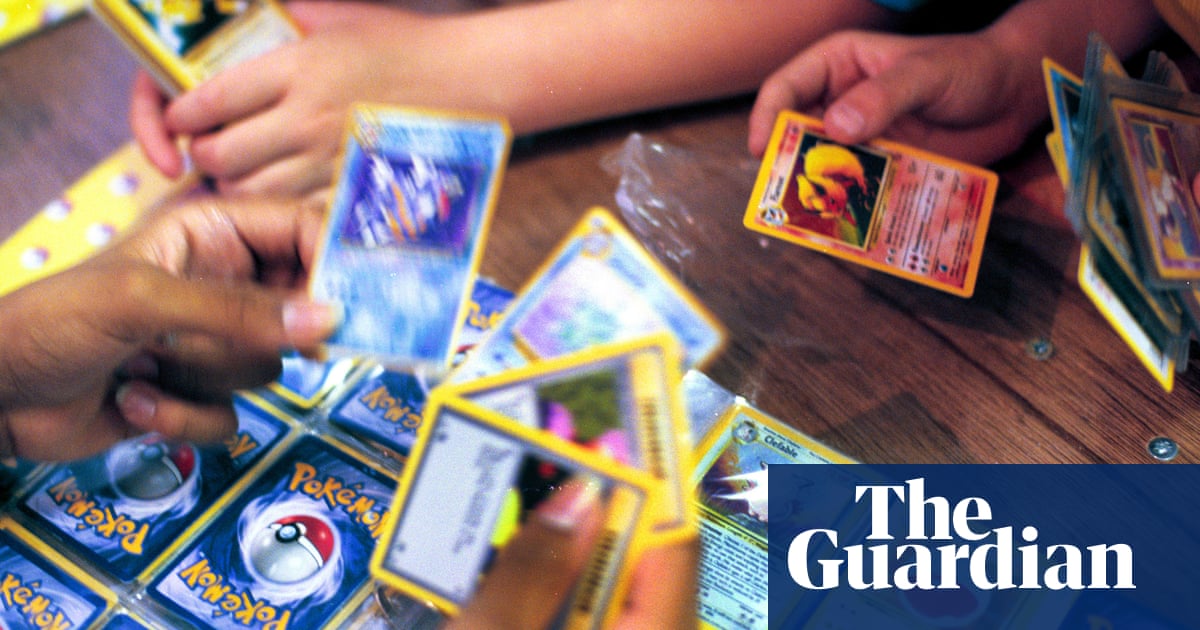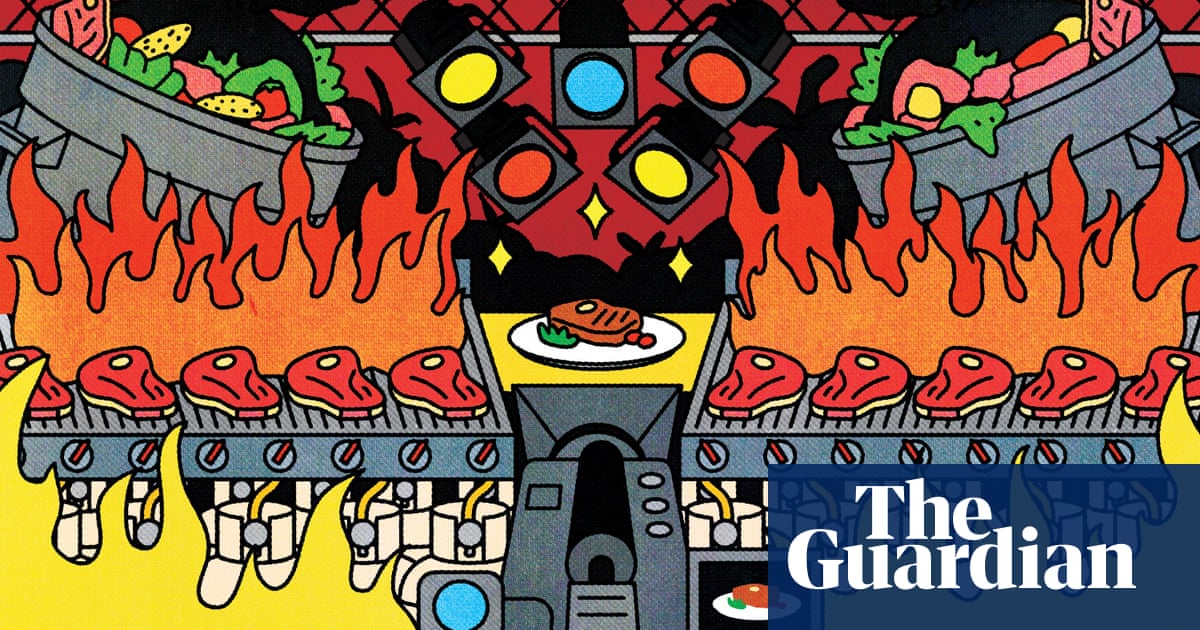
It had been billed as a record-breaking deal that would make serious investors covet 20-year-old trading cards featuring pictures of cartoon monsters.
Instead, a $375,000 (£287,000) cash transaction ended in disaster on Tuesday, when the buyer opened a sealed box that was supposed to be full of rare first-edition Pokémon cards live on YouTube – and found that the contents had been faked.
Confused? So was Chris Camillo, a “social arbitrage investor” and one of the hosts of a YouTube channel called “Dumb Money”. He said he had decided on the deal after watching the market for the Pokémon trading card game rocket in the last year and concluding that the appetite for nostalgic collectibles was not a bubble, but a serious new opportunity for long-term profit.
His confidence was helped in part by eye-watering purchases by celebrities such as the internet personality Logan Paul and rapper Logic, who paid $226,000 (£173,000) for a single card, a pristine 1999 “Charizard”, earlier this month.
The three sellers were led by Jake Greenbaum, a “blockchain entrepreneur” who uses the Twitter handle JBTheCryptoKing and was billed as Logan Paul’s “personal Pokémon consultant”. The group had themselves bought the box, which was meant to contain 36 unopened “booster” packs and a total of 396 cards, from an unnamed third party and flown to Dallas, Texas, to complete the deal.
They had asked to be paid in cash, Camillo said, and so a silver briefcase full of $100 bills sat on the table in front of the group during a live YouTube broadcast. The idea was to check on the contents, hand over the money, and sell the cards next year to benefit charity.
But a mood of anticipation as the box was opened quickly turned to bewilderment: at some point, the hoped-for rarities had been removed and replaced with filler sets that were commonplace, damaged, or otherwise worthless.
“Ooh, the colour’s different on that one and that one,” someone said. “That one’s not a first edition pack,” said someone else. “Yeah look, they’re open.”
“That’s an issue,” said Greenbaum, before getting on the phone with the original seller to seek a refund. “Yeah, no, that’s a major fucking issue.”
When the Guardian reached Camillo shortly after the broadcast ended, he said he was still “in shock”. But he noted that he still had his money. “We took extreme precautions,” he said. “I feel worse for the seller. This is going to shake up the Pokémon collector world.”
The episode seemed to be a farce – or, to some cynical observers, a stunt. But collectible experts say it is also evidence of risks attached to the vertiginous rise in the value of Pokémon cards – particularly when the most expensive items in the market, the first edition boxes, are usually sold without being unsealed, which means their contents cannot be authenticated.
The adorable monster trading cards, a fondly remembered childhood craze for millennials in the UK and around the world, form one arm of the formidable 25-year-old Pokémon empire’s reach alongside video games, memorabilia and cartoons.
While the value of the cards has been appreciating for years, they have reached a new high in 2020, said Sasha Tamaddon, the 22-year-old founder of the US-based collectible investment advisor Cardhops.
“The celebrities jumpstarted it a little bit, but you could see it happening already, especially when the pandemic hit,” he added. “All these people were going to their basements and looking at their cards and buying and selling because they didn’t really have anything else to do.”
As evidence of the speed of the rise, Tamaddon pointed to the card bought by Logic for $220,000 – which was worth about $80,000 the month before. He said he had been offered a similar first edition box to the one Camillo thought he was buying for $375,000 for $220,000 just a week previously.
Although risky, the boxes are seen as potentially lucrative valuable investments because they are so scarce, with estimates of 40-70 left in circulation. Successful buyers like Paul sometimes open them up in the hope of finding rare cards inside which they can sell off individually for a profit – making them rarer still.
Figures provided by eBay show that the sale of collectable cards on its platform has risen 123% between July and October 2020 against the same period in the previous year. Barney Ludkins, owner of the UK-based Ludkins Collectibles – which helps collectors certify the quality of their cards – said that boxes which now sell for six figures were worth about £6,000 just five years ago.
“Nothing is unexpected in this industry,” he said. “But since lockdown the hype and boom has just been crazy. The growth is exponential.”
Roy Raftery, manager of Sneak Attack Games in east London, views the change as a mixed blessing, and said that the balance between collectors and investors had shifted drastically in the last six months.
“I would have said 80-20 in favour of collectors earlier this year,” he said. “But now the only calls I’m getting are from people who don’t know anything about Pokémon but they say, this is a better investment than property, ‘give me five of your best Charizards’. It’s pricing people out.”
Meanwhile, he now spends much of his time dealing with people who have found common cards “in a box under their bed and think they’re worth a fortune”.
“They watch a couple of YouTube videos and they think their Venusaur is worth three grand,” he sighed. “And prices [for certification of cards] are rocketing because every guy wants to grade their Bulbasaur.”
In that climate, it is perhaps unsurprising that the showmanlike nature of the Dumb Money livestream lead many viewers to suspect that the whole deal was a stunt, with some pointing out that the $375,000 cash was never actually shown on camera. “Biggest scam of 2020!” said one. “The hype train has derailed!” said another.
Both parties emphatically dismiss those suspicions. “Absolutely not,” Camillo said. “I guess in the YouTube world anything is possible, but I have footage of me going to the bank, taking the money out, there absolutely was $375,000 cash in that case.” He later sent the Guardian a picture and video of the money before posting them on Twitter.
Greenbaum, for his part, pointed out that there was little obvious upside for his business in such a scam. “The amount of clout and respect I’m going to take a hit for selling a box that turns out to be fake, it’s going to be massive,” he said. He promised that he and his partners would secure a new box and get it to Camillo within days. “I don’t want exposure like this, it’s the last thing I want,” he said. “This is my reputation.”
• This article was amended on 28 October 2020 to correct the spelling of Bulbasaur.












